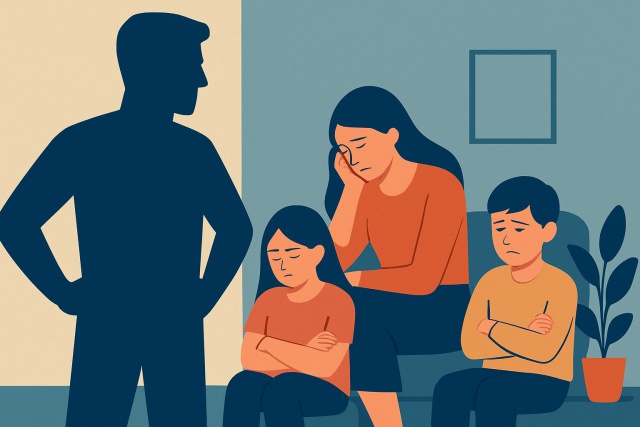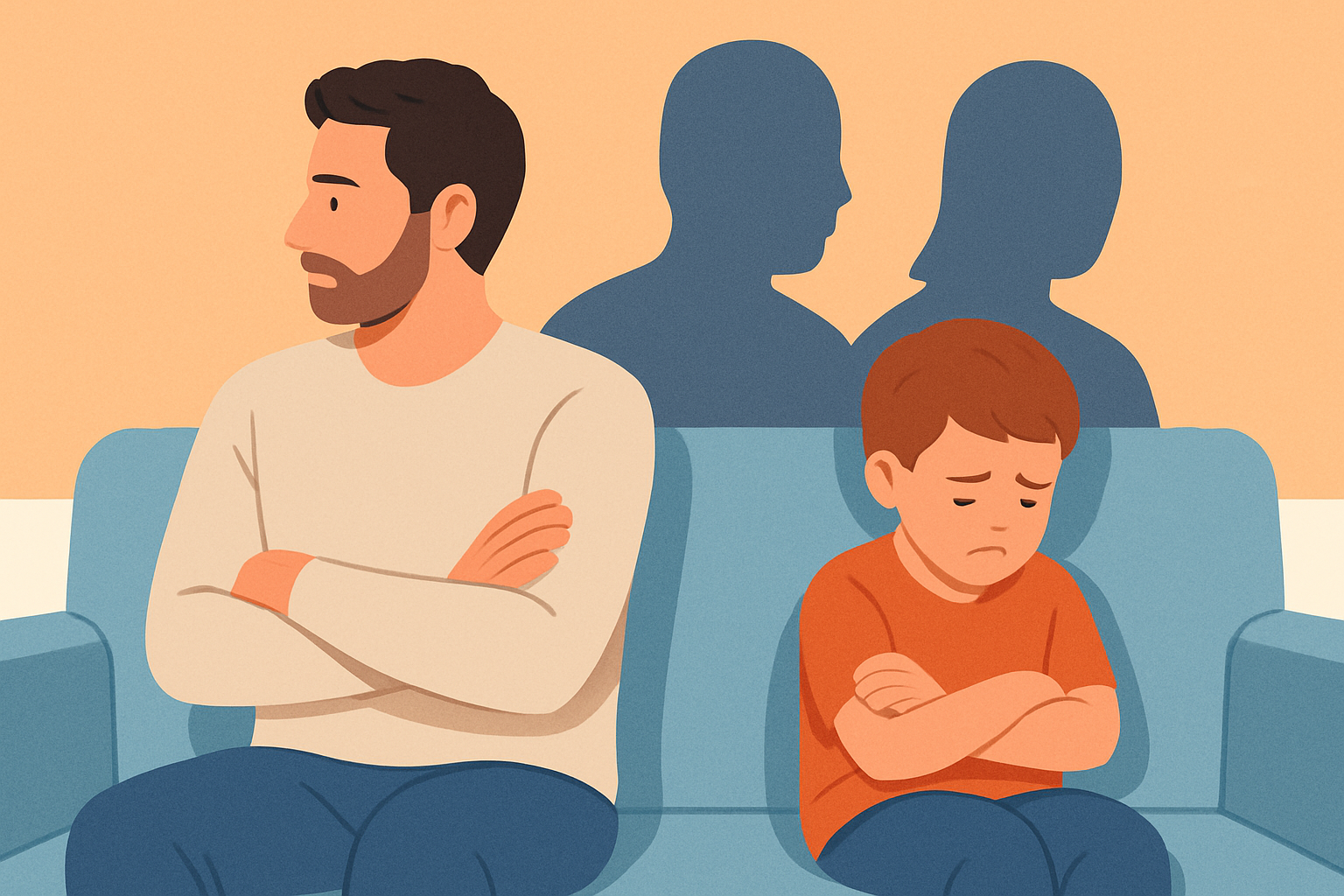
Narcissistic Father Traits That Impact Family Dynamics
Discover how narcissistic father traits shape family dynamics, affect emotional well-being, and infl...
Understanding the 7 signs of a narcissistic father is crucial, as narcissism can really shake up family dynamics, especially when fathers put their own emotional needs first and leave their children in the background.
Narcissistic traits such as grandiosity and emotional manipulation often throw a wrench into the father-child relationship due to a glaring lack of empathy. Spotting these behaviors can be a real eye-opener for those affected and helps them clearly recognize unhealthy patterns.
Narcissism is a psychological condition where someone has an inflated sense of self-importance and craves excessive attention and admiration. In the clinical world, Narcissistic Personality Disorder (NPD) is characterized by persistent patterns of grandiosity and a striking lack of empathy and manipulative behaviors.
Healthy fathers usually radiate confidence and pride and genuinely show up for their families. When pathological narcissism takes the wheel it has a nasty habit of turning people selfish and causing emotional hurt by putting their own needs ahead of nurturing those all-important family bonds.
A narcissistic father tends to leave some pretty deep scars on a child's emotional growth, chipping away at their self-esteem and making it tough to draw healthy boundaries later on.
Children of narcissistic fathers often find themselves tangled in codependent patterns, losing sight of their own needs as they try to juggle or soothe the ever-demanding emotions of the narcissist. It’s a tricky, exhausting dance that keeps emotional pain and confusion circling like a stubborn storm cloud.
Spotting narcissistic behavior in a father often means tuning into those familiar patterns that quietly but surely strain family relationships.
A narcissistic father often tries to call the shots, holding tight to his grip on the family dynamics by micromanaging every little decision or laying down strict rules like there’s no room for negotiation. This kind of control can seriously cramp a child's independence, stirring up a whole mess of emotional tension.
Sometimes, empathy feels like grasping smoke—just a bit out of reach. Limited empathy often leads to a kind of emotional distance that can leave conversations feeling cold or disconnected, even when that’s not the intention. It’s like being in the same room but somehow worlds apart, where understanding is just shy of happening.
Narcissistic fathers often struggle to genuinely recognize or respond to their children's emotions. They can seem distant, often brushing off feelings or appearing downright indifferent when their kids are upset. This kind of emotional neglect chips away at a child's sense of safety and can quietly sow the seeds of anxious attachment or feelings of abandonment.
Narcissistic fathers often have a knack for needing constant praise, so much so that it can completely overshadow their children’s own achievements. Their hunger for admiration usually takes center stage, leaving kids feeling invisible and undervalued.

Narcissistic fathers have a knack for holding the reins through manipulation, often making their children feel guilty or bending the truth until it’s almost unrecognizable. They twist facts in a way that creates a fog of confusion, unfairly pinning blame on the kids.
Narcissistic fathers often have a knack for brushing aside or outright ignoring their children’s achievements and feelings, instead of giving them the celebration they deserve. This kind of dismissive behavior can seriously chip away at a child’s sense of security.
Narcissistic fathers have a knack for bulldozing physical or emotional boundaries and often trample on their children's privacy or try to call the shots in their lives.
These fathers rarely admit when they have slipped up, instead finding ways to pass the buck onto others—even their own kids—whenever something goes south.
Standing up to the influence of a narcissistic father means knowing your emotional limits and speaking up about your needs without beating around the bush. It also means zeroing in on your own emotional independence.
Overcoming guilt and codependency usually takes intentional effort and support from therapy plus a healthy dose of patience because let’s be honest it’s rarely a quick fix. Building emotional resilience begins with owning your feelings and setting clear boundaries that stick.
Professional support often turns out to be a real lifesaver when narcissistic family patterns spiral into serious distress. Therapies like individual counseling and family therapy and trauma-focused approaches such as EMDR can genuinely help individuals untangle emotional scars and build up solid coping skills.
Many organizations and online platforms offer resources tailored for adult children of narcissistic parents, including guides that identify the 7 signs of a narcissistic father. These typically feature educational materials and peer support groups as well as directories for counseling services.
Healing from the impact of a narcissistic father often means slowly peeling back the layers to rediscover your own truth, learning the sometimes tricky art of setting clear boundaries, and finally recognizing your worth beyond the exhausting, harmful patterns you’ve been stuck in. — Dr. Anne Matthews, Clinical Psychologist
Lasting change is rare since narcissistic personality traits run deep and stubborn. Most of the time they don’t realize they need help so they’re unlikely to seek it on their own. Honestly, the smartest move is to focus on adjusting how you respond, setting firm boundaries and finding your own support system instead of holding your breath waiting for them to change.
Try to keep your cool and be firm by clearly stating your boundary without pointing fingers. For example, say something like 'I won’t discuss this topic anymore.' Brace yourself for some pushback and be ready to walk away or end the conversation if things get heated. Staying consistent is key because they love testing limits. Remember, you can’t control their reaction only how you handle yours.
Absolutely, feeling guilty is a surprisingly common companion here. Growing up with a narcissistic parent often trains you to put their feelings before your own so that guilt is actually a sign you’re starting to break free from that pattern. It’s okay to acknowledge it but don’t let it trip you up or make you backpedal. Over time, as you learn to validate yourself and put first your well-being that guilt will start to fade into the background.
Therapies like Cognitive Behavioral Therapy (CBT) can really help shift those pesky negative beliefs you might have about yourself. Trauma-informed treatments like EMDR dig deeper to heal emotional wounds. Finding a therapist experienced with family dynamics, narcissistic abuse or complex PTSD can make a huge difference in tackling the challenges you’re facing.
That’s definitely a possibility. The big difference lies in a consistent pattern of behaviors rather than just an occasional selfish act. A difficult parent might show some remorse or try to change but a narcissistic one typically lacks empathy, shifts blame onto others and refuses to take responsibility. While a mental health professional can confirm the diagnosis what really matters is how this impacts your healing journey.

Discover how narcissistic father traits shape family dynamics, affect emotional well-being, and infl...

Spotting the signs of a toxic relationship early can save your emotional health. Discover key red fl...

Stalking personality traits often mask complex psychological issues. This guide helps therapists rec...

Break free from codependent cycles by mastering the art of setting clear personal boundaries. This s...